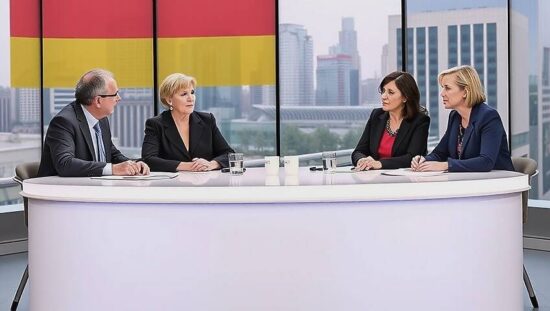In the ZDF’s “Wahlarena” on Monday evening, the top candidates of the Union, SPD, Greens and AfD faced questions from the public. The Union’s chancellor candidate, Friedrich Merz, was the first to be questioned and he was asked to explain the financial feasibility of his party’s program.
Merz referred to a rapidly growing economy that his party aims for and mentioned potential cuts to the citizen’s allowance, without providing specific numbers. He also stated that continuing the Germany ticket beyond 2025 would only be sensible if it remains affordable. When asked about better psychological care for migrants, he dodged the question and emphasized that people without a residence permit should leave the country and would not have a right to treatment in Germany.
SPD’s candidate, Scholz, spoke about the need for stable pensions and mentioned that his party is already pushing for higher tariffs in the care sector. Many experts say that the pension level cannot be maintained, but Scholz disagrees. He also stated that a strong relationship with the United States is essential and that it is crucial to combine climate protection and prosperity. This, he said, is a global problem and a central theme for our future.
Weidel, the AfD’s candidate, was directly asked about the term “Remigration” in her party’s program, which she said could deter potential care workers from abroad. She called for a distinction between asylum seekers and immigrants, stating that “everybody who is qualified is welcome, but illegals are no longer welcome in our country.”
When asked about her own homosexuality and her party’s stance on the issue, Weidel referred to a “social blueprint” of the family with a father, mother and child, which does not exclude the equalization of marriages and same-sex partnerships. When asked if Björn Höcke shares the same view, she replied, “Ask him yourself, I think so.”
Weidel also spoke out in favor of a ban on private mobile phones and tablets in schools and for parents to take responsibility in this matter. She linked the problem of a lack of skilled workers in bakeries to high energy costs and bureaucracy and suggested that this could be financed by cutting social benefits and migration.
The Green’s candidate, Habeck, was confronted with issues related to the solar obligation and the promotion of heat pumps, which he said are expensive. However, he explained that solar panels would amortize over time and heat pumps, which are subsidized by the government, are as expensive as gas or oil heaters. “Actually, your bank should also give a loan” he said.
Habeck also mentioned the difficulty of paying for low pensions and explained that the transfer of the pension system of civil servants to the regular pension system would be a massive undertaking and that nobody has dared to do so so far.
The Green’s candidate also criticized the concept of “technology openness” as a “Trojan horse” that is actually an attack on climate goals. “Whether Europe says goodbye, depends on the federal election” he said.





